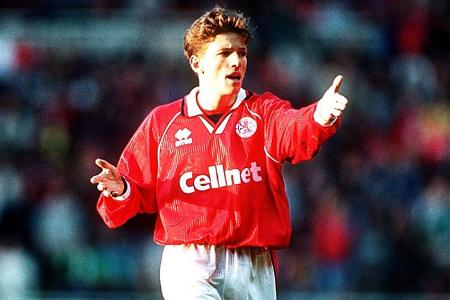How Middlesbrough changed English football
Back in October 1995, I was juggling my university studies with occasional shifts as a forklift truck driver and packer at a warehouse near Birmingham.
One morning, I picked up a newspaper and read the headline: "Middlesbrough Sign Juninho".
The news was almost unfathomable. It's difficult to imagine now but, back in the early days of the EPL, very few big stars like Juninho plied their trade in England.
On the opening weekend of the EPL season in August 1992, only 13 non-British players started for their clubs.
Yes, 13. To put that in perspective, 13 of the 14 players used by Chelsea in their last EPL clash against West Ham were foreign.
Juninho signing for Boro was totally left field.
Apparently, he'd turned down the likes of Inter Milan, Porto and Arsenal in order to sign for the team managed by my boyhood hero, Bryan Robson.
Robson had witnessed Juninho in action at Wembley in June 1995, when Brazil's reigning Footballer of the Year inspired his country to victory over the Three Lions in the Umbro Trophy.
Robson then used his status and powers of persuasion to somehow convince him to swop Sao Paulo for Middlesbrough.
By the summer of 1996, Juninho had been joined at the Riverside by fellow Brazilian Emerson - a jeri-curled bulldozer of a midfielder who was the antithesis of samba football - and Champions League-winning striker, Fabrizio Ravanelli.
All of a sudden, Middlesbrough were sexy. The signing of Juninho was a major turning point in English football.
This was the moment when mid-table teams and relegation battlers began earnestly scouring the continent for magical names.
Alas, Boro's arranged marriage of world superstars and hardworking journeymen professionals would ultimately end in failure and divorce.
RELEGATED
Incredibly, despite reaching two cup finals during that exotic 1996-97 season, Boro were relegated after a final-day defeat by Leeds.
Fast forward two decades and the current Boro side are far removed from Robson's star-studded crop.
Aitor Karanka built his promotion-winning team on a solid defensive foundation and it initially served them well, as they looked to survive their first season back in the top flight after a seven-year hiatus.
However, since Christmas, Boro have claimed only four points out of a possible 30 to slip into the drop zone.
Patrick Bamford, brought in to fire the club up the table, hasn't been involved since the defeat by Tottenham at the beginning of last month, while Karanka's personal dispute with veteran Stewart Downing reared its ugly head again at the beginning of the week.
By Thursday, the manager was gone. On Sunday, Boro entertain a Manchester United side rocked by injuries, suspension and fatigue as the fixtures pile up.
We've seen in the past how players have responded positively to a managerial change, so it's difficult to say with any degree of certainty that Jose Mourinho's men will leave the north-east with all three points.
Boro may not have a Ravanelli or a Juninho pulling the strings, but their opponents could be there for the taking if they're brave enough to release the defensive straitjacket.
Richard Lenton is the lead presenter at Eleven Sports Network. Join Richard and his guests for Eleven's live coverage of the EPL, which includes tonight's clashes between WBA and Arsenal (8pm) and Stoke v Chelsea (11pm), plus tomorrow's showdown between Middlesbrough and Man United (7.30pm). For more details, visit www.elevensports.sg
Get The New Paper on your phone with the free TNP app. Download from the Apple App Store or Google Play Store now


